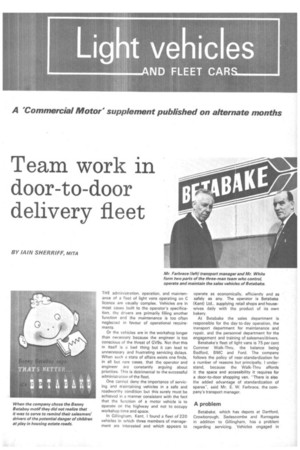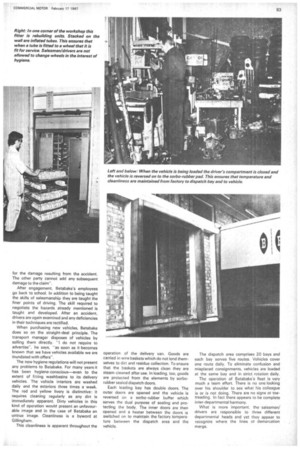Team work in door-to-door delivery fleet
Page 83

Page 84

Page 85

If you've noticed an error in this article please click here to report it so we can fix it.
BY IAIN SHERRIFF, mITA
THE administration, operation, and maintenance of a fleet of light vans operating on C licence are usually complex. Vehicles are in most cases built to the operator's specification. the drivers are primarily filling another function and the maintenance is too often neglected in favour of operational requirements.
Or the vehicles are in the workshop longer than necessary because the engineer is too conscious of the threat of GV9s. Not that this in itself is a bad thing but it can lead to unnecessary and frustrating servicing delays. When such a state of affairs exists one finds, in all but rare cases, that the operator and engineer are constantly arguing about priorities. This is detrimental to the successful administration of the fleet.
One cannot deny the importance of servicing and maintaining vehicles in a safe and roadworthy condition but this surely must be achieved in a manner consistent with the fact that the function of a motor vehicle is to operate on the highway and not to occupy workshop time and space.
In Gillingham, Kent, I found a fleet of 220 vehicles in which three members of management are interested and which appears to operate as economically, efficiently and as safely as any. The operator is Betabake (Kent Ltd., supplying retail shops and housewives daily with the product of its own bakery.
At Betabake the sales department is responsible for the day-to-day operation, the transport department for maintenance and repair, and the personnel department for the engagement and training of salesmen/drivers.
Betabake's fleet of light vans is 75 per cent Commer Walk-Thru, the balance being Bedford, BMC and Ford. The company follows the policy of near-standardization for a number of reasons but principally. I understand, because the Walk-Thru affords it the space and accessibility it requires for a door-to-door shopping van. "There is also the added advantage of standardization of spares", said Mr. E. W. Farbrace, the company's transport manager.
A problem
Betabake. which has depots at Dartford, Crowborough, Sedescombe and Ramsgate in addition to Gillingham, has a problem regarding servicing. Vehicles engaged in door-to-door sales are invariably involved in a low mileage. This is certainly so with Betabake, which is located in the heart of a densely populated area. The bakery is on the perimeter of a housing estate and the Medway towns of Chatham, Rochester and Strood are almost appendages. Vehicles cover between 100 and 130 miles a week.
Where mileage is low,vehicles are normally serviced on a time basis but somewhere along the line time and mileage must be related. Betabake has settled on a five-week cycle which puts the mileage at between 500 and 650. At 3,000 miles, or about twice annually, the vehicles (which in the Commer range are all diesels) are "light-docked". During this period they are fully examined and road-tested. Thereafter any necessary repairs are carried out. At 20,000 miles, or about every three years. the vehicles are completely dismantled and rebuilt with service units. Mr. Farbrace told me that the company has adopted the policy of building up its own replacement units ready for service.
The squeeze is having an effect on most aspects of industry and commerce and it looked at one time as if the effect on Betabake's fleet would be to reduce its £8,000 stockholding of MT spares. Betabake has had difficulty in obtaining spares but recently the local Rootes distributor offered to put into stock sufficient fast-moving parts to meet most contingencies.
Mr. Farbrace points out that on work such as bakery delivery it is essential to maintain a service to the housewife and until he is sure that spares are to hand locally he intends to ensure that he has adequate stocks in his own store.
Despite the low mileages, heaviest replacement demand is for tyres. A tyre worn down on the crown is a rarity at Betabake: tyres are usually scrapped due to sidewall fracture. It occurs to roe that a scuffing strip on the sidewall could reduce the mortality rate.
More prevalent in this field than in most others is accident damage. One accident every 2,600 miles would send a long-distance man off looking for a less arduous post. On doorto-door operation this is an accepted part of the operation.
Mr. Farbrace tells me that .5d. per mile of his total cost of 1s. 2d. per mile is allocated to accident repair. He estimates that in 50 per cent of the accidents the company's drivers are in some degree blameworthy. In most cases the damage results from reversing. The transport manager points out that most of the mileage is covered in housing estates. Often a driver has to reverse 100 yards and more and in so doing he may have to negotiate a dozen hazards including parked cars and other delivery vehicles.
Prior to engagement, salesmen/drivers are required to undergo a driving test set by the company driving instructor, Mr. M. 0. White. Formerly a lieutenant in the Royal Navy, in which he served for 32 years, Mr. White not only checks the skill of prospective employees but is required to maintain the high standards set by the company.
When a driver is involved in an accident he phones Mr. White who puts the accident procedure into operation. Where the damage suggests that the vehicle should be returned to the garage a replacement vehicle is despatched and the load is transferred.
Mr. White, armed with camera, meets the driver at the accident spot and gets an on-thespot report. If two vehicles are involved, both are photographed for a permanent record. Says Mr. White: "This way we get claims only for the damage resulting from the accident. The other party cannot add any subsequent damage to the claim".
After engagement, Betabake's employees go back to school. In addition to being taught the skills of salesmanship they are taught the finer points of driving. The skill required to negotiate the hazards already mentioned is taught and developed. After an accident, drivers are again examined and any deficiencies in their techniques are rectified.
When purchasing new vehicles, Betabake does so on the straight-deal principle. The transport manager disposes of vehicles by selling them directly. "I do not require to advertise", he says, "as soon as it becomes known that we have vehicles available we are inundated with offers".
The new hygiene regulations will not present any problems to Betabake. For many years it has been hygiene-conscious—even to the extent of fitting washbasins to its delivery vehicles. The vehicle interiors are washed daily and the exteriors three times a week. The red and yellow livery is distinctive: it requires cleaning regularly as any dirt is immediately apparent. Dirty vehicles in this kind of operation would present an unfavourable image and in the case of Betabake an untrue image. Cleanliness is a byword at Gillingham.
This cleanliness is apparent throughout the operation of the delivery van. Goods are carried in wire baskets which do not lend themselves to dirt and residue collection. To ensure that the baskets are always clean they are steam-cleaned after use. In loading, too, goods are protected from the elements by sorborubber sealed dispatch doors.
Each loading bay has double doors. The outer doors are opened and the vehicle is reversed on a sorbo-rubber buffer which serves the dual purpose of sealing and protecting the body. The inner doors are then opened and a heater between the doors is switched on to maintain the factory temperature between the dispatch area and the vehicle. The dispatch area comprises 20 bays and each bay serves five routes. Vehicles cover one route daily. To eliminate confusion and misplaced consignments, vehicles are loaded at the same bay and in strict rotation daily.
The operation of Betabake's fleet is very much a team effort. There is no one looking over his shoulder to see what his colleague is or is not doing. There are no signs of toetreading. In fact there appears TO be complete inter-departmental harmony.
What is more important, the salesmen/ drivers are responsible to three different departmental heads and yet they appear to recognize where the lines of demarcation merge.




































































































































